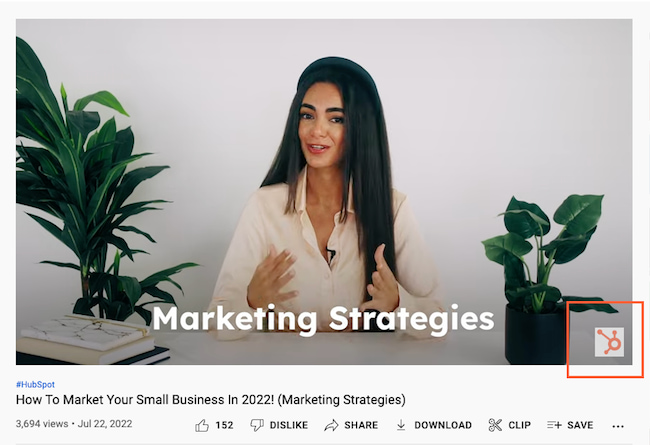How to Make a YouTube Channel
- Sign in to your Google account (or register and sign in if you don’t have one).
- Create a new YouTube channel using your Google account.
- Navigate to the Customize Channel page.
- Add Basic Info to your channel for discoverability.
- Upload branding elements to your channel.
- Customize your more advanced layout options.
- Add videos and optimize them for search.
Can’t create a new channel?
If you see a “This action isn’t allowed” message when you try to create your channel, you may be using an outdated version of the YouTube app.
Here are your options to move forward:
- Update the YouTube app on your device.
- Create your YouTube channel using a browser on your computer (following the steps outlined in more detail below).
How to Create a YouTube Channel
Creating a well-managed YouTube channel with consistent content can help businesses grow better, but doing it right is just as important. Here’s how to do it step-by-step.
1. Sign in to your Google account.
You’ll need a Google account to watch, share, create, and comment on YouTube content. Go to youtube.com and click “Sign In” in the upper right-hand corner. From there, you’ll be taken to a Google sign-in page.
- You’ll be prompted to sign in if you have a Google account.
- If you have multiple Google accounts, select the one you want to be associated with the YouTube channel.
- If you do not have a Google account, click “Create Account” and follow the prompts to register for one.
2. Create a new YouTube channel using your Google account.
Once you’re set up with and signed into your Google account, it’s time to create a channel. Click your user icon in the upper right-hand corner. This represents both your Google and YouTube accounts (as Google owns YouTube). You’ll see a drop-down menu where you’ll want to click “Settings.”
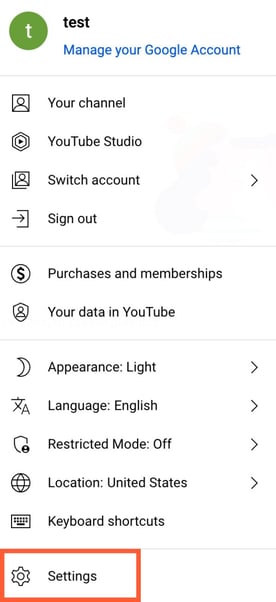
From there, you’ll be taken to your account overview. Click “Create a new channel” under “Your channel.”

The first step is to create your new channel name. It can be whatever you want and doesn’t have to be the same name you used to create your Google account, but we recommend that it reflect the brand the YouTube Channel will represent.
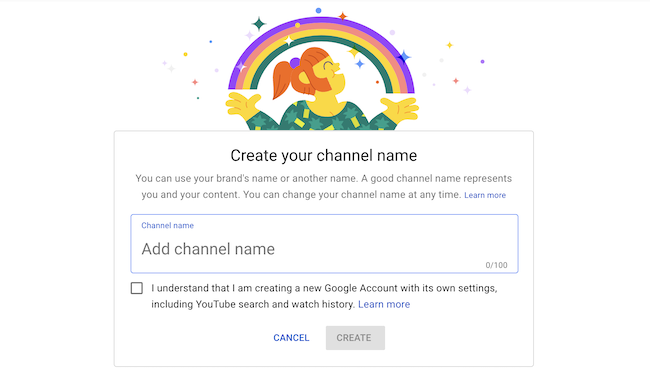
After you enter the channel name, you might be asked to verify the account via text message or voice call. If that happens, enter the code you receive from your chosen option.
Once you’ve verified your account, you’ll be taken to the dashboard for your channel. Now, it’s time to start customizing it.
3. Navigate to the Customize Channel page.
We’ll start with the fundamental details about your channel. From your channel dashboard, click “Customize channel.”
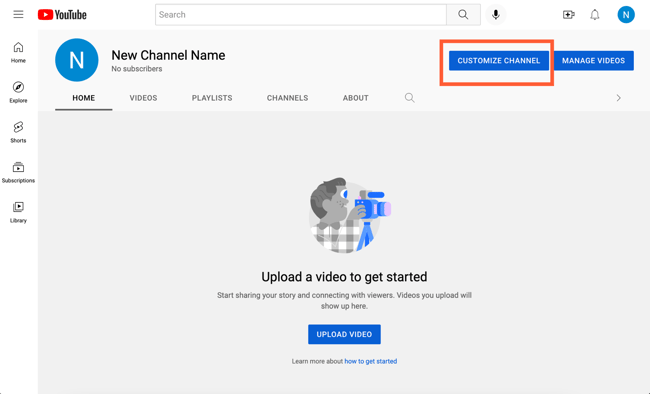 From there, you’ll be taken to the channel customization page.
From there, you’ll be taken to the channel customization page.
You’ll notice three tabs: “Layout,” “Branding,” and “Basic info.” These three tabs will help you optimize your channel for viewers.
4. Add Basic Info to your channel for discoverability.
Start by clicking “Basic info.”
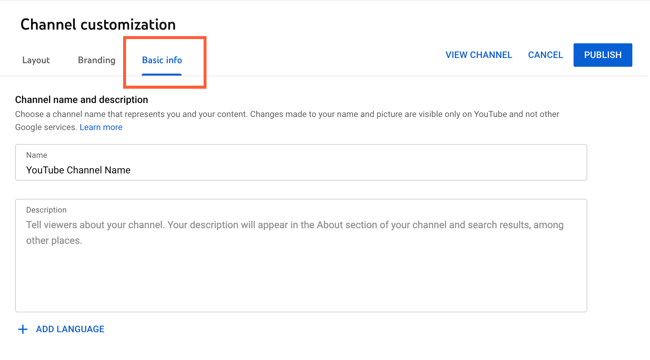
Here’s where you’ll enter some basic information about your channel, like the language your videos are in, as well as a description that helps people discover your channel when they enter search terms that describe what videos they’re looking for. These keywords can include your channel, the problems it helps solve, the people and products featured, your industry, and more.
You’ll also be able to add links to sites you want to share with your viewers. These links will be displayed over your banner image (more on this later) like so:
5. Upload branding elements to your channel.
In addition to the descriptive details you’ve added, a new YouTube channel needs another customization element: the visuals.
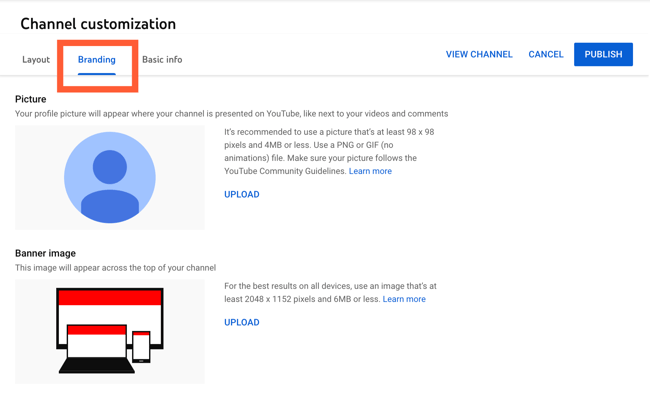
Under the “Branding” tab, you can add your profile picture, banner image, and video watermark.
Profile Picture
Profile pictures help YouTube users identify the creator of a video when browsing video content. As shown below, this image appears beneath YouTube videos on the play page. YouTube recommends using a picture with dimensions of at least 98 x 98 pixels.
 Banner Image
Banner Image
The banner image is a large banner displayed at the top of your channel page, and it’s an ample opportunity to convey your brand to your viewers. YouTube recommends using an image that’s at least
2048 x 1152 px and 6MB or less.
Video Watermark
The video watermark is displayed at the bottom right of every video you post (see below). You’ll want to choose a logo that best represents your size at 150 x 150 px.
6. Customize your more advanced layout options.
Click the “Layout” tab.
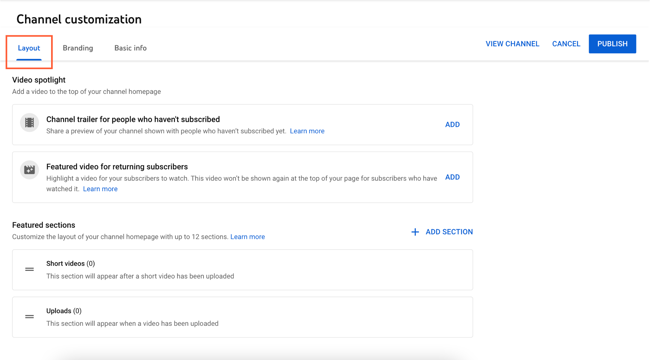
From here, you can specify certain details about how you want your content presented on your channel’s page. You can designate a video spotlight and organize your channel page with featured sections.
7. Add videos and optimize them for search.
To upload your first video to YouTube, click the “Create” button in the top-right corner and follow the prompts.
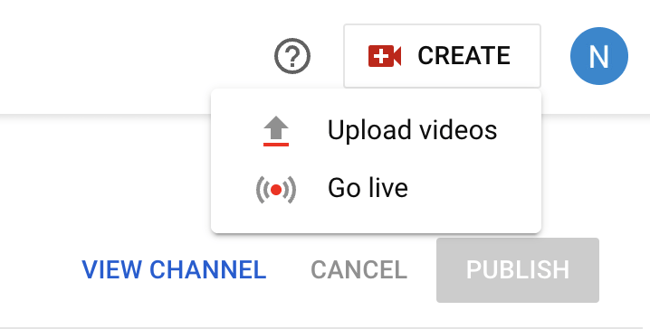
Optimizing your channel for discoverability is just the beginning. Once you start adding videos, you’ll want to optimize them for search, which in turn helps users discover your video.
But this goes beyond giving your videos accurate, clear, and concise titles — though that is important. Below, we describe some of the most important things to optimize on YouTube.
Title
When we search for videos, one of the first things our eyes are drawn to is the title. The title often determines whether or not the viewer will click to watch your video, so it should be compelling, clear, and concise.
Description
This should be limited to 1,000 characters. Remember that your viewer came here to watch a video, not to read a lot of text. Plus, YouTube only displays the first two or three lines of text, which is about 100 characters, so front-load the description with the most important information.
Tags
Using tags doesn’t just let viewers know what your video is about — they also help YouTube understand your video’s content and context. That way, YouTube can associate your video with similar videos, broadening your content’s reach. But approach with caution: just as with your title, don’t use misleading tags because they might get you more views. Google might penalize you for that.
Category
Choosing a category is another way to group your video with similar content on YouTube — but that might not be as simple as it sounds. YouTube’s Creator Academy suggests that marketers “think about what is working well for each category” you’re considering by answering questions like:
- Who are the top creators within the category? What are they known for, and what do they do well?
- Are there any patterns between the audiences of similar channels within a given category?
- Do the videos within a similar category share qualities like production value, length, or format?
That’s it — you’ve officially created a YouTube channel and now know how to optimize its content for discoverability. For more information on how to best leverage YouTube for marketing, check our entire collection of resources.


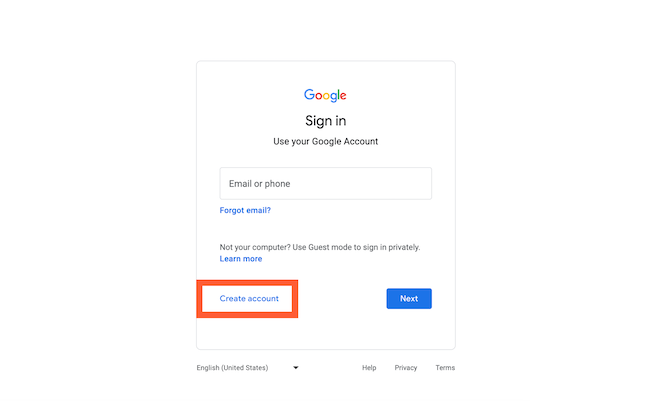
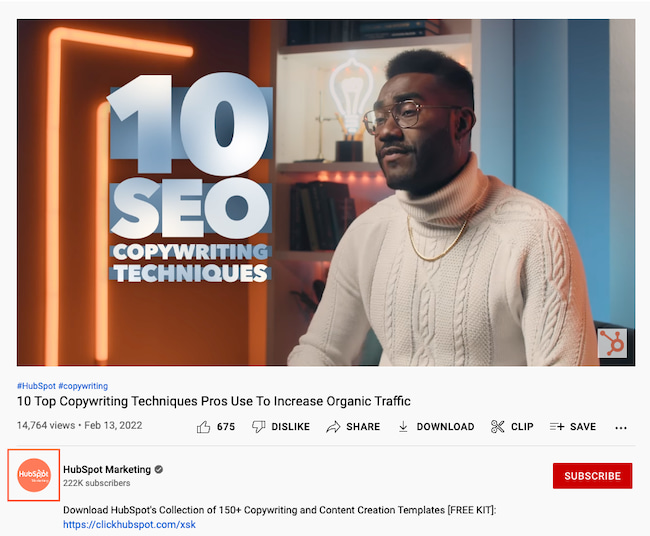 Banner Image
Banner Image